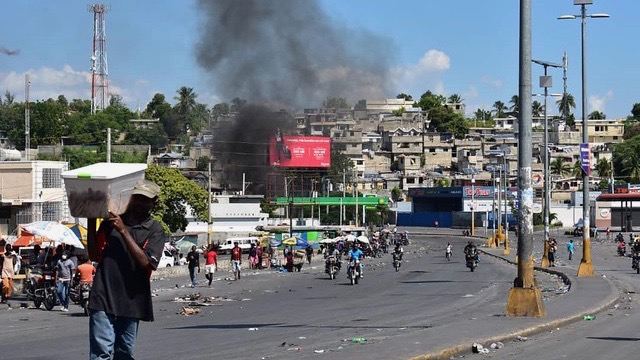On October 4, Haitian trade unions across several sectors observed a 24-hour national strike in rejection of the growing gang violence and fuel shortage in the country as well as against the violent deportation of Haitian migrants from the United States. The majority of shops, schools and transport services remained closed in the capital Port-au-Prince and other major cities. Only healthcare centers continued providing services.
The diverse sectors condemned the increase in murders and kidnapping by armed groups and the rampant displacement due to insecurity. The assassination of deacon Sylner Lafaille and the abduction of his wife Marie Marthe Laurent Lafaille on September 26 at the doors of the First Baptist Church of Port-au-Prince by heavily armed individuals, has been condemned widely by organizations as a clear manifestation of this concerning trend.
Meanwhile, the Association of Engineers and Architects demanded the resignation of the director of the Haitian National Police (PNH), León Charles, in relation to the kidnapping of pastor Jean Mary Feret Joseph the day before. On October 3, at around 8 am, heavily armed individuals dressed in police uniforms broke into the Jesus Center Church of Delmas 29 and kidnapped the pastor along with two other people who accompanied him.
“The security situation in the country is increasingly precarious. The armed groups, benefited by the complicity of certain political and economic authorities, are multiplying throughout the country, particularly in the Haitian capital,” stated the association.
Lawyer André Michel, leader of the opposition Popular and Democratic Sector party (SDP), also demanded the police chief’s resignation, accusing him of being complicit with armed gangs.
In April, the Human Rights Analysis and Research Centre of Haiti (CARDH) reported that kidnappings for ransom increased by 300% as compared to the previous month and warned that the situation could worsen in the coming month. According to the CARDH’s latest report, over 150 murders and 200 kidnappings were recorded in the country in the month of June alone. Additionally, according to the reports by UN agencies, at least 19,000 people were internally displaced in the capital in the summer of 2021 alone due to the violence.
The unions also denounced the scarcity of fuel at the stations and its availability in the black market at two or three times higher than its price. It is important to note that at the beginning of September, the Association of Petroleum Professionals (APPE) reported that armed gangs had ceased major oil terminals.
Likewise, they also fiercely rejected the brutal treatment of Haitian migrants by the US authorities. They also criticized Prime Minister Ariel Henry for not condemning their violent expulsion in the midst of the multiple crises facing the country.
On October 1, the International Organization for Migration confirmed that over 6,000 Haitians have been deported from the US, Mexico and the Bahamas since September 19. Various UN bodies have called on these countries to refrain from expelling these migrants without a proper assessment of their individual needs.
In contrast to these countries, on October 2, Cuba announced that it would assist the Haitian migrants, who arrived in the country on the journey to the US. The Cuban government provided them with accommodation as well as food and medical assistance.
Haiti, which is the most unequal and poor country in the region, has been experiencing a deepening socio-political and economic crisis since 2018. The situation was aggravated after the assassination of its de-facto president Jovenel Moïse on July 7 and he devastating earthquake of August 14, forcing tens of thousands to leave their country. According to the UN new food security data, around 4.4 million people are facing acute food insecurity in Haiti.





